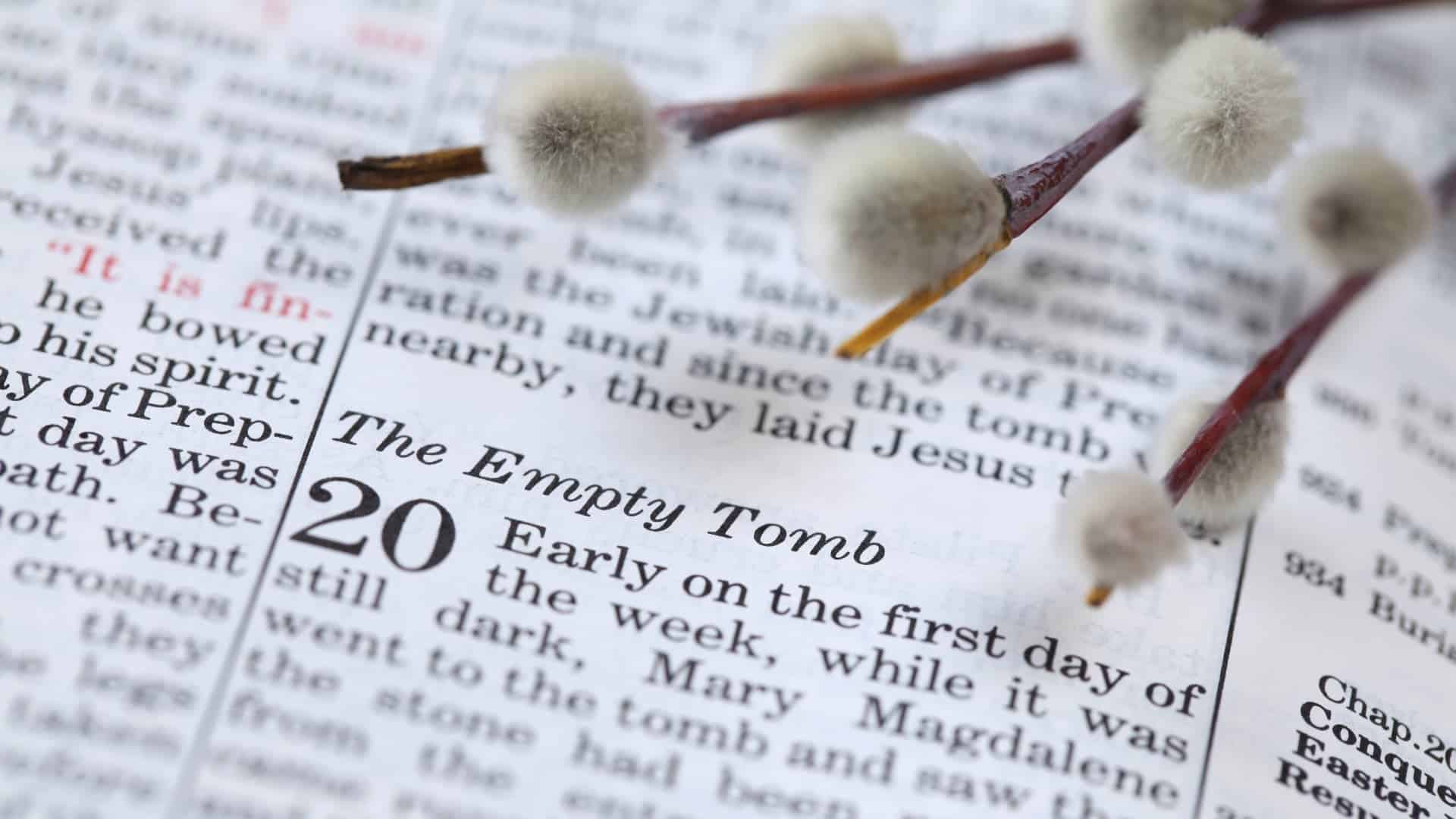The Ritual and Reality (John 2:13-22)

Big Idea: Jesus exposes religious pretension and replaces it with himself.
Purpose: To expose our tendency to replace reality with ritual, and to see Jesus as the answer to this problem.
When I was a child, we had this picture of Jesus hanging in the Sunday School room at my church. As I remember, the picture was of Jesus as a shepherd holding a sheep. He had light brown hair and blue eyes, and he looked like a very gentle and serene man. I can’t remember all the details, but I can remember the feeling from the picture that Jesus is a very peaceable type of man who probably never raised his voice or got upset.
This view of Jesus seems to be a popular one. A hymn about Jesus has these words, “Gentle Jesus, meek and mild, look upon a little child…” Theologian N.T. Wright states that many popular depictions of Jesus portray him as: “a hippy peace-child, a delicate flower of a man, a dew-eyed first-century Jewish Gandhi. Why would anyone want to hurt Him? Maybe because He’s so annoyingly precious; but that’s not the story of the gospels.” Instead, Wright says, we should be looking for a “crucifiable” Jesus, a Jesus who does something so provocative as to make the religious leaders of the day murderously hostile.
And that’s exactly the Jesus we find today. We’ve been looking at the Gospel of John, and today we come to the first public event that takes place in John’s gospel.
Don’t miss that: this is not a random event. This is Jesus going to Jerusalem, the center of religious and political life. This is Jesus in the spotlight for the first time in the Gospel of John. We’re going to see that Jesus is not who we expect. In particular, we are going to see two things, and the first is this:
Jesus exposes religious pretension.
That’s the first thing we’re going to see in this passage: Jesus exposes religious pretension.
I love watching movies, and I certainly love watching movies that involve James Bourne or 007. Quite often these movies involve a chase scene through a crowded market, usually on a motorcycle. In those scenes, tables get knocked over. People jump out of the way at the last minute. Things get destroyed, and general mayhem takes over. One of the reasons that I love watching these movies is because it’s so chaotic, so unbelievable. I expect that kind of ruckus from James Bond or James Bourne, but not from Jesus.
But here we see Jesus entering the Temple, what someone called the “beating heart of Judaism” (Wright). This was the center of everything: of worship and music, politics and society. It was the place where Israel’s God had promised to live in the middle of his people. It was the focal point of the nation.
And we see Jesus choosing one of the most important times: Passover, the holiest and most important religious celebration commemorating when God delivered the nation of Israel from captivity in Egypt. And mayhem ensues.
In the temple he found those who were selling oxen and sheep and pigeons, and the money-changers sitting there. And making a whip of cords, he drove them all out of the temple, with the sheep and oxen. And he poured out the coins of the money-changers and overturned their tables. And he told those who sold the pigeons, “Take these things away; do not make my Father’s house a house of trade.” (John 2:14-16)
This is not the Jesus we expect! When this happens, there are Roman troops stationed in the Fortress Antonio overlooking the temple in case there are any problems. And yet Jesus takes deliberate, calculated action. He goes and makes a whip of cords. He comes back and drives the merchants out of the Temple. People are running. Animals are all over the place. Money is flying. Tables are being knocked over. What is going on here?
We’d better be careful to state what’s not going on. This is not Jesus just losing his temper or having a hissy fit. Jesus does not need an anger management course. To dismiss this as the impulsive act of someone with a temper problem would be to miss the whole point of what is happening in this passage. There is anger here, but it is a righteous anger, not an impulsive one. There’s much more to the story than a simple temper tantrum.
John has already told us his thesis: that this is God himself in flesh entering the Temple. You even see a hint of that in verse 17, where the disciples remember a psalm about a righteous sufferer who is consumed with zeal for God’s house. In other words, Jesus enters the Temple as God himself in the flesh, and is filled with righteous anger against what he sees.
And the thing that he judges is religious pretension. He has no time for the religious games going on, for religious hucksters. What has him so angry? It’s the corruption of true worship. It’s that ritual had replaced reality; that religion had become a front for greed. The place that was supposed to represent God’s holy presence had instead become a profit center. Jesus is the enemy of religious pretension.
I guess there are a couple of concepts we have to get our minds around tonight as we think about this. One is the idea that God gets angry; the other is the idea that God, in Jesus, hates religious pretension. In other words, religion can actually be a dangerous thing when it is not genuine worship. You could put a warning label on religion just like you see on a bottle of toxic chemicals. Eugene Peterson said it best: “Religion is the death of some people.”
One of the best things I’ve ever read on both of those topics is in a book with an unusual name: The God Who Smokes. No, it’s not about God lighting up a cigarette. It’s about a God who is…
…so full of passion and blazing emotion that he burns – and yes, smokes in the ferocity of his infinite, holy love that compelled him to give it all away for his Bride. And he who gave it all for us is worth giving ourselves completely to.
The author writes of God’s desire that we not substitute religious pretension for true worship in these words:
God really believes that he is the most worthy, most majestic, magnificent, glorious, stunningly beautiful being in the universe. And he is fixated on the certainty that only he deserves worship – that to him alone belong honor, glory, and praise forever and forever. With red-rimmed, stinging eyes and burning hair, all we can say is – he is right. He is astonishingly beautiful, utterly majestic and perfect in the symmetries of justice and righteousness, knowledge, and wisdom. He is as hypnotically compelling as a surging forest fire and ten times as dangerous. He is out of control – ours, not his.
That’s the picture we see in this passage: a God who believes that there is such a thing as true worship; who believes that religious pretension is the enemy of what we need most, which is true worship; and who burns with passion and a desire to overturn religious pretension.
Let’s put it a different way. God wants true worshipers, and he is against everything that becomes a substitute for true worship, even if that substitute is religion. Religion can be a substitute for what we need most, which is a relationship with the true and living God. Chad Walsh said these words:
I suspect that Satan has called off his attempt to convert people to agnosticism. After all, if a person travels far enough away from Christianity, he or she is always in danger of seeing it in perspective and deciding that it is true. It is muchness safer, from Satan’s point of view, to vaccinate a person with a mild case of Christianity so as to protect him from the real disease.
It’s a little like this time that I was talking to Charlene. I had my back turned to her and went on for quite a while. I thought we were having a really good conversation. Eventually I turned around and saw that Charlene had long left the room and I didn’t even know it. That’s what is happening here: they are going through all kinds of activities directed to a God who has long stopped paying attention to all of their religious rituals and performances.
As Flannery O’Connor said, one of the best ways to avoid Jesus is to avoid sin. One of the best ways to avoid Jesus is to be religious. Or, as someone else has said, there are two ways to avoid God: irreligion and religion. Religion is just as bad as irreligion. Both are dangerous, because both lead us away from a genuine relationship with God. Jesus is not calling us to religion. Jesus has no time for religion. Jesus has no time for religious pretension. He reserved some of his hardest words and actions for religious people. Ritual can replace reality, and it’s deadly. Jesus calls us to something completely different, which we are going to see in a minute.
What was taking place in the Temple was all the outward activity with none of the genuine reality. The motives had become mixed: it was much more about what they could get from the Temple rather than responding in grateful joy to what God has done. Religion, quite frankly, can be a way of avoiding Jesus. Jesus hates religious pretension.
Jesus replaces it with something better.
This passage is not just about Jesus hating religious pretension. Jesus replaces religious pretension with something far better.
You see this in verse 18. The Jewish leaders ask Jesus for his credentials: what sign does he offer for taking this radical action? It’s a fair question. It’s a way of asking what right he has to clear the Temple like he did.
Listen to what Jesus said in response in verse 19: “Destroy this temple, and in three days I will raise it up.” The religious leaders were incredulous when they heard this:
The Jews then said, “It has taken forty-six years to build this temple, and will you raise it up in three days?” (John 2:20)
As they spoke these words, they were standing in what is known as the Second Temple. It had been standing for centuries, but Herod had been working on rebuilding it for decades, and the work still wouldn’t be completed for another thirty-some years. It was a project that lasted over eighty years and involved over ten thousand workers. He did such a good job that he made it even more magnificent than even Solomon’s original Temple had been. It ranked among the world’s wonders of the day. Even when Jerusalem was attacked and destroyed in 70 CE (A.D.), the commander of that attack tried to spare the Temple from destruction because of its beauty. Listen to what Jesus’ disciples said about the Temple: “Teacher, look at these tremendous buildings! Look at the massive stones in the walls!” (Mark 13:1). Josephus, one of the most famous historians of that day, wrote that his Temple project was “the most glorious of his actions…sufficient for an everlasting memorial of him.” Herod was a lavish builder of cities and projects, and that has to go down as one of his greatest accomplishments.
So how could Jesus say that they could tear the Temple down, and he would rebuild it in three days? Two things. First, he’s saying that they’re destroying the Temple by their abuses.
When you desecrate the worship of my Father with your white-washed greed, you destroy what this temple is, and you expose it to the wrath of God. It will indeed be destroyed. And that happened 40 years later when the Romans leveled it in A.D. 70. (John Piper)
They’re killing the Temple by their actions, he says. They’re destroying it.
But there is a deeper meaning. He is referring to himself as the Temple.
Just like you kill worship in the temple with your consumerism and materialism, you will kill me. I and my Father are one. If you destroy his house, you destroy me. If you treasure money more than my Father, you will treasure my destruction—and buy it with 30 pieces of silver. (Piper)
Jesus says: Let me give you the sign that I have the authority to condemn the Temple. You are going to kill me, and when you destroy me, I will raise it up again.
So what he’s saying is this:
First, that Jesus is the new Temple. We don’t need a building anymore to represent God’s presence on earth. We don’t need the Temple anymore because Jesus is now the connecting point between us and God. In a month we are celebrating Christmas and singing about Emmanuel, God with us. Authentic worship is not be attached to Jerusalem or any other place. It is attached to Jesus. There is no pilgrimage to Jerusalem. There will only the movement of the heart from money and religion to Jesus Christ. Jesus asks us to turn away from religion to himself.
Second, he’s saying that the resurrection is the ultimate authentication that he is who he says he is. Jesus says, “You want proof that I have the right to condemn religious pretension? Just wait until you kill me and then I raise myself up in three days.” The real question for all of us is whether the resurrection really happened or not. Pay attention to this question. If it did, then we need to pay attention to Jesus. If Jesus really did come back from the dead as he said here, we need to pay attention to him, because he is no ordinary man.
That’s what we learn here. Jesus condemns religious pretension, and he replaces it with himself. Jesus is the alternate to the ritual of religion. Jesus is the way of connecting with God. And he gave his life willingly for you so that you could be in relationship with God. Jesus is the way of connecting with God.
Conclusion
This isn’t just a story about some hypocritical religious leaders a long time ago. It’s really our story too. At the end of this passage we learn that the problem isn’t just out there; the problem is within everyone of us as well.
Verses 23 to 25 lay it out for us:
Now when he was in Jerusalem at the Passover Feast, many believed in his name when they saw the signs that he was doing. But Jesus on his part did not entrust himself to them, because he knew all people and needed no one to bear witness about man, for he himself knew what was in man.
This is amazing. Even among those who trusted Jesus, there is something that is not trustworthy. Jesus knew that even among those who believe, there is something fundamentally wonky. We are prone to get it wrong. Even among those who have true faith in Jesus, there is the possibility that we will ritual will replace reality.
That’s the bad news. The good news is that despite the fact that Jesus knows this about us, he loves us. I love what John Piper says about these verses:
You always have a person who is willing to love you, knowing absolutely everything about you. The reason I say he is “willing to love you” is that Jesus has a special covenant love for those who trust him.
Christianity is not about becoming better people. It’s not about becoming a better version of ourselves through self-improvement. It’s about looking outside of ourselves to the only One who has the power to change us from the inside-out. It’s never about following a set of rules or becoming the best we can be. It’s about looking to Jesus, the only One who is worthy of our trust.
The ground of our hope is never that we will get it right, individually or as a church. The ground of our hope is that there is someone who knows us, who knows how unreliable we can be, and who has come to give himself for us. He is the reality. He invites us to come today to him and trust him.
Jesus exposes our misunderstanding and disobedience and replaces it with something better. Let’s come to him and cast ourselves upon him today.





